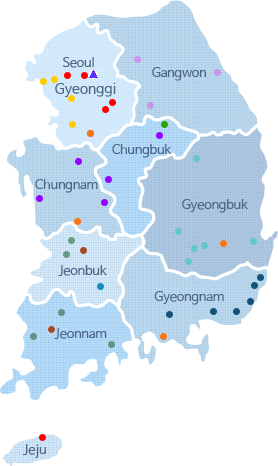About the UNESCO Associated Schools
UNESCO Associated Schools Project Network (ASPnet)
 UNESCO ASSOCIATED
UNESCO ASSOCIATED
SCHOOLS PROJECT NETWORK: ASPNET
In an effort to promote peace and international cooperation through school education,
the United Nations Educational, Scientific, and Cultural Organization (UNESCO) launched
the ASPnet in 1953, connecting 33 schools across 15 member states.
The Associated Schools making up the UNESCO’s ASPnet strive to realize the principal ideals of the UNESCO—peace, freedom, justice, and human rights—through various educational activities.
School boards and teachers actively lead the process of upholding and realizing these values on the sites of learning, experimenting with diverse and innovative models of teaching and learning.
Over 10,000 schools of 180 countries participate in the active exchange of information and experiences across national borders along the network.
The member schools in Korea have been indispensable to the history of international and sustainable education for world citizens in the country. The Korea National Commission for the UNESCO have been working alongside these schools for almost half a century to establish peace-, human rights-, multiculturalism-, and environment-focused education as norms in the Korean society, promoting international cooperation and peace through education.
The ASPnet in Korea, which began with 4 middle and high schools in 1961, has grown over time to include 407 institutions as member schools as of May 2015, including 124 elementary schools, 86 middle schools, 189 high schools, 4 special schools, and 5 universities.
Learning Activities and Themes
 UNESCO ASSOCIATED
UNESCO ASSOCIATED
SCHOOLS PROJECT NETWORK: ASPNET
Each school participating in the ASPnet
chooses one or more of the four core themes of UNESCO education,
and designs and provides diverse learning and related activities accordingly.
- 1World concerns and the UN system
- UN priorities
The school chooses one or more of the urgent concerns of the world, and encourages students to look for and devise solutions that can be implemented at the local, national, and international levels.
Students consider the roles of international organizations and participating schools in the process.
- 2Environmental issues and sustainable development
- ESD:Education for sustainable development
Students discuss and gain better understanding of the economic, social, and environmental implications and issues of sustainability. They research local issues and trends that threaten sustainability, understand how these issues affect all stakeholders involved, and discuss how meaningful changes can be made at the level of individual perception and behavior.
- 3Peace and human rights
- Peace and Human rights
Students share their experiences and thoughts on peace and human rights, and reflect on the importance of respecting the human rights of others. They explore various related issues, including racial discrimination, problems facing migrant workers, women’s rights, the status of ethnic minorities, employment and unemployment, the UN Charter of Human Rights, and the democratic decision-making process.
- 4Intercultural learning
- Intercultural Learning
Students take a holistic and interdisciplinary approach, encompassing history, geography, social studies, languages, fine arts, music, and the like to think about and discuss cultural diversity. Through activities and exchange with immigrants and their families, students come to understand and respect different cultures, traditions, and religions.
Go to the UNESCO Associated Schools Project Network website.





